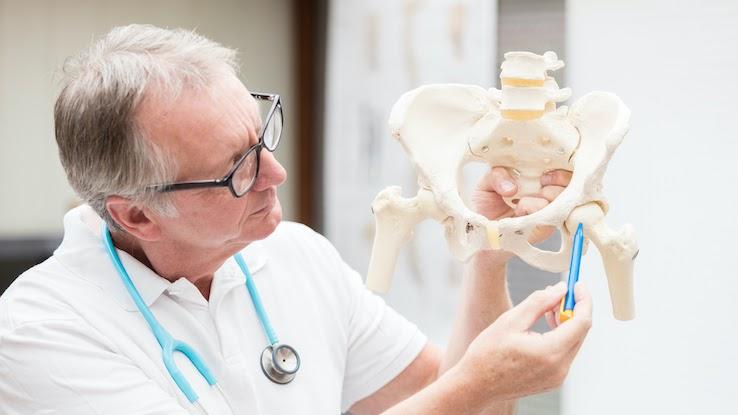Here We Go Again! Hip Hop

A total hip replacement, also chosen total hip arthroplasty, is a procedure in which a surgeon removes your hip articulation and replaces it with a prosthetic joint. Typically, the doc makes 1 long incision in your hip to remove the os and cartilage that have been damaged. There's also a less invasive version of this surgery in which the surgeon makes one or two smaller incisions to install the joint implant. This can result in a quicker recovery fourth dimension.
In the U.s., surgeons perform more than 450,000 hip replacements each yr. There are a few unlike reasons why your healthcare provider may recommend yous for a hip replacement surgery. Arthritis of various kinds can harm joints not only in your hip, but also in your knees and easily. Fractures or breaks can damage the joint and may cause swelling and hurting. Arthrosis in your hips can as well cause joints to rub together, which can be painful long term. Learn more about these and other conditions that often result in the need for hip replacement surgery.
Osteoarthritis
The most common reason for hip replacement surgery is osteoarthritis, which is the most mutual type of arthritis. This condition is the outcome of cartilage breaking down around the areas where the ends of your basic encounter in your joints. When the cartilage starts to disintegrate, the bones of your joint kickoff to rub together, causing pain and swelling.
If yous accept osteoarthritis in your hip, over time, your hip bones may start growing to replace the lost cartilage. These growths are known equally bone spurs, or osteophytes, and they too cause stiffness and hurting. Hip replacement surgery is an option that relieves pain and stiffness associated with osteoarthritis.
Some symptoms of osteoarthritis include:
- Pain
- Swelling
- Loss of flexibility
- Formation of spurs
- Disability to move the joint
- Popping or cracking noises when moving your hip
Damaged Hip Joint
Injuries, fractures and bone tumors can cause harm to your hip joint. Surgery is the most effective method of repairing this type of damage to a hip joint. In that location are not-invasive treatments that assistance salve pain associated with damaged hip joints. Yet, healthcare professionals generally recommend hip replacement surgery when the hurting and stiffness begin interfering with your power to perform daily activities.
Information technology's rare to experience an injury after having your initial hip replacement, but if y'all get a fracture because of an accident or weakened bones, you lot may demand to have the prosthetic replaced. Surgery is usually necessary if a fracture occurs in the basic around the joint following joint replacement surgery.
Rheumatoid Arthritis and Osteonecrosis
Rheumatoid arthritis is a medical status that develops when your allowed system begins attacking the membrane that lines your joint. Rheumatoid arthritis leads to inflammation, stiffness and pain. In some cases, this medical condition tin can destroy a hip joint entirely. Joint hurting and stiffness are symptoms that directly affect the hip. If your hip hurting only happens in the morning, information technology's a sign of osteoarthritis.
Osteonecrosis, likewise called avascular necrosis, is a medical condition that can lead to the destruction of the bone in your hip joint. This condition occurs when the blood supply to the bone is restricted, normally due to an injury. This causes the bone to die. Y'all might not feel any pain initially, merely your joint will gradually become more painful over fourth dimension. You lot may first to feel pain in the joint fifty-fifty when y'all aren't moving. Osteoarthritis can too occur due to this status.
Both of these weather are severe and require hip replacement surgery.
What Are the Risks of Hip Replacement Surgery?

Serious complications happen in fewer than ii% of hip replacements. But, in that location are still some risks to consider. Infection and blood clots are the most common risks with a hip replacement, but your doctor will discuss prevention methods with you before surgery. There's also the possibility of leg length inequality, pregnant that i of your legs may be shorter or longer than the other subsequently surgery. Nerve and blood vessel damage around your hip expanse is likewise possible.
The purpose of hip replacement surgery is to remove diseased or damaged areas of your hip joint. This procedure replaces parts of your hip articulation with artificial parts. Hip replacement surgery can enhance your ability to move, relieve pain and ameliorate walking. The surgery can as well help reduce the effects of osteoarthritis and damage as a result of injuries or fractures.
Resource Links
"Total Hip Replacement," OrthoInfo
"Minimally Invasive Total Hip Replacement," OrthoInfo
"Osteoarthritis," National Institute of Arthritis and Musculoskeletal and Peel Diseases
"Symptoms of Rheumatoid Arthritis," NHS
"Fracture After Total Hip Replacement," OrthoInfo
"Osteonecrosis," National Institute of Arthritis and Musculoskeletal and Skin Diseases
Source: https://www.symptomfind.com/healthy-living/hip-replacement-surgery-common-causes?utm_content=params%3Ao%3D740013%26ad%3DdirN%26qo%3DserpIndex
0 Response to "Here We Go Again! Hip Hop"
Post a Comment